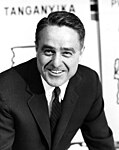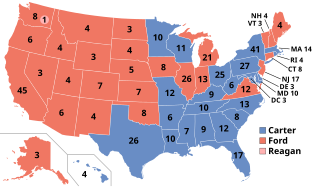
The 1976 United States presidential election was the 48th quadrennial presidential election, held on Tuesday, November 2, 1976. Democrat Jimmy Carter, former Governor of Georgia, defeated incumbent Republican president Gerald Ford in a narrow victory. This was the first presidential election since 1932 in which the incumbent was defeated, as well as the only Democratic victory of the six presidential elections between 1968 and 1988.

Birch Evans Bayh Jr. was an American Democratic Party politician who served as U.S. Senator from Indiana from 1963 to 1981. He was first elected to office in 1954, when he won election to the Indiana House of Representatives; in 1958, he was elected Speaker, the youngest person to hold that office in the state's history. In 1962, he ran for the U.S. Senate, narrowly defeating incumbent Republican Homer E. Capehart. Shortly after entering the Senate, he became Chairman of the Subcommittee on Constitutional Amendments, and in that role authored two constitutional amendments: the Twenty-fifth—which establishes procedures for an orderly transition of power in the case of the death, disability, or resignation of the President of the United States—and the Twenty-sixth, which lowered the voting age to 18 throughout the United States. He is the first person since James Madison and only non–Founding Father to have authored more than one constitutional amendment. Bayh also led unsuccessful efforts to ratify the Equal Rights Amendment and eliminate the Electoral College.
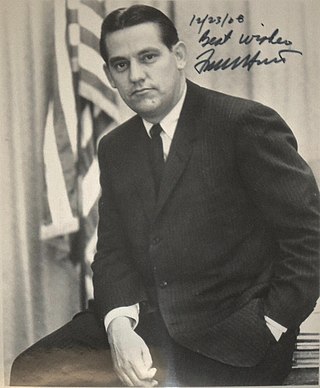
Fred Roy Harris is an American retired politician from Oklahoma who served as a member of the United States Senate from 1964 to 1973.

The 1980 United States Senate elections were held on November 4, coinciding with Ronald Reagan's victory in the presidential election. The 34 Senate seats of Class 3 were contested in regular elections. Reagan's large margin of victory over incumbent Jimmy Carter gave a huge boost to Republican Senate candidates, allowing them to flip 12 Democratic seats and win control of the chamber for the first time since the end of the 83rd Congress in January 1955.

The 1976 Democratic National Convention met at Madison Square Garden in New York City, from July 12 to July 15, 1976. The assembled United States Democratic Party delegates at the convention nominated former Governor Jimmy Carter of Georgia for president and Senator Walter Mondale of Minnesota for vice president. John Glenn and Barbara Jordan gave the keynote addresses. Jordan's keynote address made her the first African-American woman to deliver the keynote address at a Democratic National Convention. The convention was the first in New York City since the 103-ballot 1924 convention.
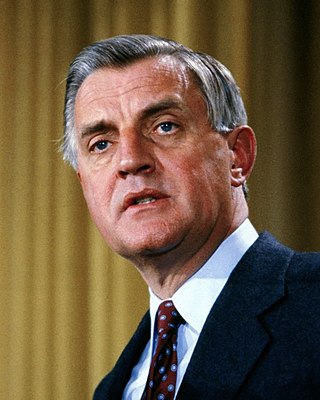
From February 20 to June 12, 1984, voters of the Democratic Party chose its nominee for president in the 1984 United States presidential election. Former Vice President Walter Mondale was selected as the nominee through a series of primary elections and caucuses culminating in the 1984 Democratic National Convention held from July 16 to July 19, 1984, in San Francisco, California.
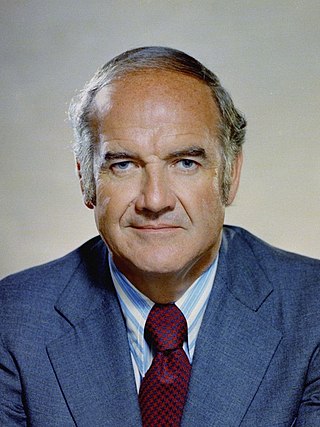
From January 24 to June 20, 1972, voters of the Democratic Party chose its nominee for president in the 1972 United States presidential election. Senator George McGovern of South Dakota was selected as the nominee through a series of primary elections, caucuses, and state party conventions, culminating in the 1972 Democratic National Convention held from July 10 to July 13, 1972, in Miami, Florida.
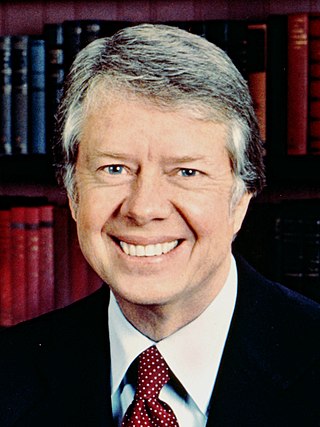
From January 27 to June 8, 1976, voters of the Democratic Party chose its nominee for president in the 1976 United States presidential election. Former Georgia governor Jimmy Carter was selected as the nominee through a series of primary elections and caucuses culminating in the 1976 Democratic National Convention held from July 12 to July 15, 1976, in New York City.

Electoral history of Jimmy Carter, who served as the 39th president of the United States (1977–1981) and the 76th governor of Georgia (1971–1975).

Electoral history of Ted Kennedy, United States Senator from Massachusetts (1962–2009) and, at the time of his death, the second most senior member of the Senate.

Electoral history of Robert Byrd, senior United States senator from West Virginia (1959–2010), president pro tempore of the United States Senate, Senate majority and minority leader (1981–1987). He was also the longest-serving U.S. senator in history, as well as the previous longest-serving member of Congress.

Electoral history of George Wallace, 45th governor of Alabama, 1968 American Independent Party presidential nominee and candidate for 1964, 1972 and 1976 Democratic Party presidential nomination

The 2008 presidential campaign of Evan Bayh, Democratic Senator and 46th Governor of Indiana, began shortly after the 2004 presidential election.

The 1976 United States elections were held on November 2, and elected the members of the 95th United States Congress. The Democratic Party won the presidential election and retained control of Congress.

This article contains lists of candidates associated with the 2016 Democratic Party presidential primaries for the 2016 United States presidential election.

Timothy E. Kraft was a retired Democratic political consultant, best known as the campaign manager for the unsuccessful reelection bid of U.S. President Jimmy Carter. In September 1980, only weeks before the general election, he stepped down amid an uncorroborated charge, later resolved, that he had previously used cocaine.
Since 1983, the Democratic Party of the United States holds a few debates between candidates for the Democratic nomination in presidential elections during the primary election season. Unlike debates between party-nominated candidates, which have been organized by the bi-partisan Commission on Presidential Debates since 1988, debates between candidates for party nomination are organized by mass media outlets.

The 1976 United States presidential election in Wisconsin took place on November 2, 1976 as part of the 1976 United States presidential election. Jimmy Carter won the state of Wisconsin with 49.50 percent of the vote giving him 11 electoral votes.
In the 1976 United States presidential election, Jimmy Carter and his running mate, Walter Mondale, were elected president and vice president, defeating incumbent Republican president Gerald Ford and his running mate, Bob Dole.

The 1976 New Hampshire Democratic presidential primary was held on February 24, 1976, in New Hampshire as one of the Democratic Party's statewide nomination contests ahead of the 1976 United States presidential election.






